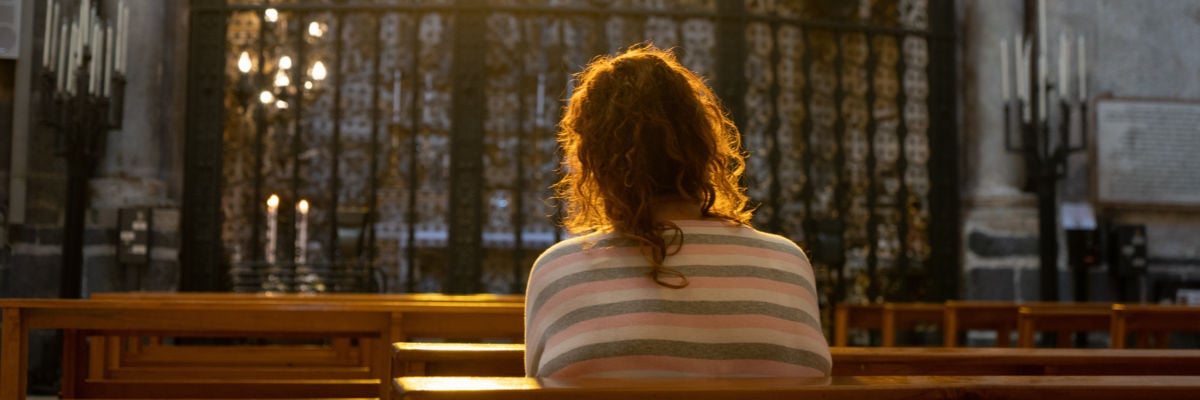
In recent days, my diocese has been all over Catholic headlines. This is due to the bishop of Charlotte, Bishop Michael Martin, drafting numerous documents that restricted the traditional Latin mass (TLM), updated liturgical expectations for the New Mass, and then postponed the restrictions on the TLM. All this to say, it has been quite chaotic to be a member of the Charlotte Diocese these past two weeks.
As someone who joined the Catholic Church later in life, I think I have fresh eyes with which to view the Church. Having transitioned from the Archdiocese of Chicago to the Diocese of Charlotte, I have witnessed and experienced the “cultural tug-of-war” within the Church and among its members that Martin references in his draft letter on the liturgy. As a result, I have tried my best to avoid living in ideological extremes.
Martin, in his leaked drafted letter, acknowledged the vast division of liturgical expression within the Church and especially within our diocese. To attempt to solve this issue, he created some liturgical norms and expectations for parishes in the diocese that troubled a lot of people (me included).
Although it is easy to jump to conclusions and concern, it is important to keep in mind that the letter was only a draft, and Martin seems open and willing to change, considering his recent reversal of the restriction of the TLM. Additionally, my experience with many priests in the diocese has been immensely positive, and I am hopeful that the bishop will listen especially to the concerns of the presbyterate, who empathize with many people’s reactions to this letter.
The liturgical division that Martin addresses is something I find troubling at times, too. Within our diocese, you can walk into a parish that is booming with conversation right before Mass, with modern instruments and music in the liturgy—and then walk into a parish that is silent before Mass, with an organ and Latin hymns. It is strange that someone may have vastly different experiences with the Catholic Mass depending on the parish he chooses that morning.
As someone who previously was a non-denominational Christian, I can understand the appeal of a parish similar in temperament to other Christian churches. That’s what I would have wanted If someone had invited me to Mass while I was not Catholic. Therefore, I can understand the openness to a liturgical style that embraces outsiders more easily and makes the Mass more accessible to them. With that being said, it is also important that this parish obeys what Vatican II envisioned for the liturgy (which means, among other things, sacred silence at times, preference for Latin in the prayers, and no guitars or drums).
On the flip side, as a convert from non-denominationalism, one of my biggest draws to the Catholic Church was its reverent liturgy. I struggled for so long with the normalized worship in the non-denominational Protestant world, since it was so drastically different from the liturgy and worship God commands in the Old Testament. I desired something sacred—something set apart from my day-to-day experiences as a SoCal teenage girl. Entering a church with coffee in my hand to sing some songs and listen to a sermon was not an elevated, set-apart experience for me.
When I discovered the Catholic liturgy and all its biblical and historical roots, I realized just how much I was missing in the non-denominational world—and just how much I desired to worship God through the sacrifice of the Mass. My love and yearning for beautiful priestly vestments, churches, language, and music increased drastically as I was brought into the Church. All I wanted was to worship God in accordance with the scriptures and the councils of the Church, which so beautifully laid the groundwork.
One of my favorite quotes is from St. Augustine, who refers to God as “beauty ever ancient and ever new.” The more I sought Our Lord, especially in the Eucharist, the greater my desire was to encounter beauty, most especially in the Holy Mass. My experience was not unique. The more I encountered converts from the Protestant world, especially in Charlotte, the more I discovered just how much other young people share this sentiment.
This makes sense, considering what our generation has experienced and struggled with, especially in the West. With ever-declining churchgoer rates, and with ever-increasing nihilism and technological advancements, we are facing something that no previous generation had to deal with: a deep void and an epidemic of purposelessness. If we can have anything at our fingertips, at any time we want, what is the need for religion or God? If many of our friends and families do not attend church or practice any faith, why should we?
When you are a young person taking your faith seriously, you are often an outsider in the West. You feel alone, misunderstood, and even mocked or judged at times. This was my experience beginning at fourteen years old, and this is the experience of many young converts.
As a result, when we step into church, we desire two things: community and sacredness. We want a reminder that we are not alone, but are surrounded by people on the same mission as us: to become saints. We also desire to be immersed in a place that reminds us that this world is not our home, but raises our hearts and minds to our heavenly home. This is what gives us the strength and hope to persevere in a world that can be so cruel at times toward Christians.
Since the liturgy “is the summit toward which the activity of the Church is directed” and “the font from which all her power flows,” it is important to get the liturgy right (Sacrosanctum Concilium 10). I sympathize with Bishop Martin’s desire for unity in the liturgy and the Church, in our country and our world—but I am hesitant to prescribe uniformity as the means to get there. The greatest mysteries of our faith make us question how God can be both three and one, and how both humanity and divinity can coexist in the same person. In God, we find the ultimate reconciliation of two seemingly opposing concepts. If this is the case, I have faith that there is a way for God to reconcile our diocese, with all its different preferences and expressions.



